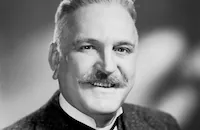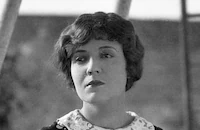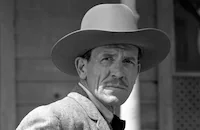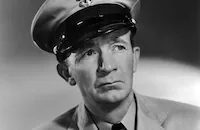There's Always Tomorrow
Cast & Crew
Edward Sloman
Frank Morgan
Binnie Barnes
Lois Wilson
Elizabeth Young
Robert Taylor
Film Details
Technical Specs

Synopsis
Joseph White is disappointed when his wife Sophie decides to stay home with their five grown children rather than celebrate their wedding anniversary with him, as she constantly neglects him. That night, Joseph is unable to find a quiet spot in the house where he can read his newspaper and ends up on the porch. Alice Vail, Joseph's former secretary, comes to the house and surprises Joseph, whom she has not seen for years. Alice and Joseph fell in love when they worked together, but never consummated the relationship, and Alice left for Europe. Joseph is delighted with her company and while he goes in the house to get a coat, Alice meets his youngest daughter Marjorie, who tells her how her father is ignored by the family. Alice and Joseph go to the theater together and have a wonderful time, and later, Joseph learns that she has never married. On one of his Thursday lodge nights, Joseph is forced to take the streetcar in the snow because his children have borrowed his car. The children happen to see him go into Alice's house that night and park outside to see what happens. Hours later, Joseph leaves, but the car will not start. Realizing who they are, Alice invites Joseph's children in while they wait for the tow truck. The eldest, Arthur, is so shocked and offended by his father that he is barely civil to Alice, but his fiancé Helen Graham, and his brothers and sisters, Janet, Marjorie, and the twins, Dick and Fred, graciously accept her hospitality. Alice cleverly tells them the story of her platonic relationship with Joseph without revealing his identity, and also reveals that she is aware that Joseph has been lonely because his family is selfish and treats him as a helper, rather than a father. Upon returning home, everyone except Arthur is kinder to Joseph. By the next Thursday night, however, they are all determined to prevent him from leaving, knowing that he will go to Alice's rather than the lodge. Just as he is about to leave, Alice comes to the door to say goodbye, as she has decided to return to Europe. She pretends that Helen left her purse at her house and finishes her "story" with the children: the man she fell in love with was never in love with her. Outside, Alice tells Joseph that Helen warned her of his children's feelings and that she knows he does indeed love her, but that the happiness of his family is more important than her own. Joseph pleads with her not to leave, but Alice knows better and departs. A little later, Joseph joins Sophie as she walks to the movie theater, and she reaffirms her love for him.

Director
Edward Sloman
Cast

Frank Morgan

Binnie Barnes

Lois Wilson

Elizabeth Young

Robert Taylor
Louise Latimer

Helen Parrish
Maurice Murphy
Dick Winslow

Margaret Hamilton

Alan Hale
Dean Richmond Benton
Anne Darling
Gene Lewis
Jack Murphy
Ray Brown
Charles King

Kenneth Macdonald
Eugene Farley
John Mcmann

Walter Brennan
Crew
Christine Ames
Scott Beal
Norbert Brodine
Ora Curtis
John P. Fulton
Charles D. Hall
Henry Henigson
William Hurlbut
Arthur Kay
Carl Laemmle Jr.
Daniel Mandell
M. F. Murphy
Vic Noerdlinger
Cora Palmatier
Mary West

Film Details
Technical Specs

Quotes
Trivia
Notes
This film was also known as To-day We Live, and was later released under the title Too Late for Love. A pre-release article in Motion Picture Herald credits Christine Ames with the continuity. In 1941, according to a Hollywood Reporter news item, the studio had planned to produce another adaptation of Ursula Parrott's novel, with Erle Kenton as the director. That version was not made, but the novel was used the basis for the 1956, Douglas Sirk-directed Universal release of the same title. The 1956 film starred Fred MacMurray and Barbara Stanwyck.












